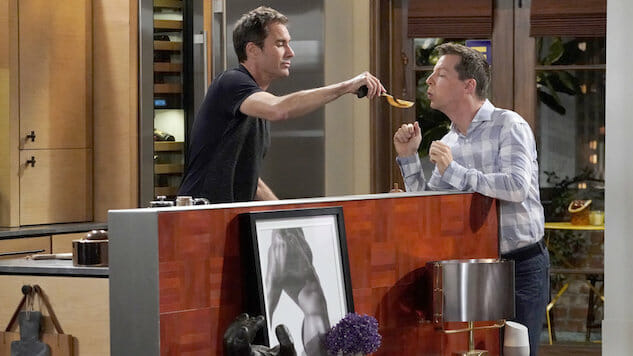My Complicated, Long-Term, On-Again/Off-Again Relationship with Will Truman
Photo: Chris Haston/NBC
In “Will Works Out,” from the first season of Will & Grace, Will Truman (Eric McCormack)—a fusty, high-strung attorney with more quips in his quiver than an Atlantic City lounge act—slurs his friend, Jack McFarland (Sean Hayes)—a bombastic, chronically underemployed performer with more quips in his quiver than Will Truman. The setup is simple: Will invites Jack to his gym on a “buddy pass” only to act ashamed of his pal’s presence, as if the latter’s “flamboyance,” to use the common euphemism of the time, were a form of guilt by association. He spends half the episode trying to rein Jack in, shushing him, corralling him, even intercepting a (straight) client before Jack has a chance to flirt. (“Do you have to do the little flourish? It’s like we’re doing The Mikado here!” still sets me giggling, I’ll be honest.) In one of the sitcom’s improbable twists, Jack’s bench-pressing within earshot, but out of sight, when Will hops off his treadmill, hesitates, and says to Grace (Debra Messing) under his breath, “Sometimes he’s just such a… fag.”
Of the series’ main quartet, Will is the character toughest to love, so of course I love him the hardest: I want him, and I want nothing to do with him, often in the space of a single scene. Jack is always “just being Jack,” as Grace suggests in “Will Works Out”; Karen (Megan Mullally), the soused socialite, embraces her selfishness to the point that it becomes pardonable; Grace has her moments, though the fact remains that Will comes off worse when his straitlaced tendencies crash into her free-spirited ones. He’s handsome, intelligent, responsible, well off; he’s also stiff, mean-spirited, judgmental, prickly. In the comedy that introduced me to a few of the ways one could be gay, he is, as it were, the straight man, and having grown up with Will & Grace, I will tell you that I have been in awe of Will Truman, often infatuated with him, and occasionally appalled by him—the constituent parts in a complicated, long-term, on-again/off-again relationship. The difference, watching both the original series and NBC’s revival with 11 more years under my belt, is that the nature of the relationship has changed. I don’t want Will Truman. I am Will Truman, or some version thereof, for better and for worse.
This may explain why “Will Works Out,” which first aired when I was too young to appreciate its A-plot’s subject, now carries a certain sting: I am around the age Will was then, and I’ve felt the same shame he does more times than I can count. Part of this is the pressure, tacit or explicit, to “butch it up” for straight folks, one I suspect nearly every gay man feels at one time or another—stretching one’s voice to reach a lower octave; changing one’s gait; worrying over the movement of one’s hands, or the position of one’s arms; unlacing one’s fingers from a partner’s, or glancing around, as if by instinct, before stealing a public kiss. But the other part, the one that runs deeper and hurts more, is that other pressure, the ugly sense of guilt by association: To my enduring embarrassment, I have more than once cringed at a friend’s “little flourish,” or hesitated to bring a date to a party, fearful that he’d come across as too “femme.” As Will & Grace understood way back in the spring of 1999, the fact that the one form of pressure stems from the other doesn’t excuse me from aiming my stiff, mean-spirited, judgmental, prickly worst at someone else. I can only offer an apology to any man I’ve mistreated along the way: As Jack rightly says when Will doubles down on the insult, “I’d rather be a fag than be afraid.”
In this sense, the fact that the new Will & Grace hasn’t rekindled the old flame is unsurprising. After all, it’s scarcely changed: Will and Grace are (still) living together, Jack’s (still) just being Jack, Karen’s (still) a soused socialite, though she’s more prone to name-drop Melania Trump than Ivana. What has changed are the times, which the series’ latest iteration handles ham-fistedly; I want to send a copy of the revival’s premiere, in which Will romances a conservative congressman and Karen snookers Grace into redecorating the Oval Office, to every showrunner in America, as an example of how not to tackle politics. Set aside the icky moral panic of Jack’s line about getting “finger herpes” from Grindr, or Karen’s repeated references to the Republican presidents of generations past, and you’re (still) left with a day late, dollar short stab at “timeliness,” one that only underscores the series’ (not always unpleasant) preserved-in-amber quality. Will & Grace is (still) at its best in the spit takes-and-slapstick register of its initial run: Hayes’ tilting, knock-kneed fight against a magnetic compression suit in the second episode, “Who’s Your Daddy,” had me in stitches, no joke.
This is the thing about Will & Grace—it’s more effective when it sidles up to the point than it is when shouting it. Both the Trump-themed “11 Years Later” and “Will Works Out” share the same subject, Will’s hypocrisy, but only the earlier episode manages to animate it, turning Jack’s parodic “butch” routine, replete with Knicks jersey, into a blistering criticism of Will’s actual one. In contrast to the boldfaced statement of the “updated” Will & Grace — “I like you thinking that I’m a better person than I really am,” Will confesses to Grace after returning from Washington, “because it makes me want to be a better person” — the original is not so self-conscious; simply tackling the stigma against “fags” and “femmes” was, and (still) is, a political statement, one far more meaningful than any jab involving a bag of Cheetos or a Russian-English dictionary.